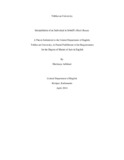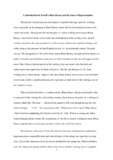Please use this identifier to cite or link to this item:
https://elibrary.tucl.edu.np/handle/123456789/3045Full metadata record
| DC Field | Value | Language |
|---|---|---|
| dc.contributor.author | Adhikari, Harimaya | |
| dc.date.accessioned | 2021-02-25T10:49:13Z | |
| dc.date.accessioned | 2021-07-23T04:25:07Z | - |
| dc.date.available | 2021-02-25T10:49:13Z | |
| dc.date.available | 2021-07-23T04:25:07Z | - |
| dc.date.issued | 2014 | |
| dc.identifier.uri | http://elibrary.tucl.edu.np/handle/123456789/3045 | - |
| dc.description.abstract | This thesis explores the subordination of the working class in Anna Sewell’s Black Beauty. Sewell vividly concretizes the ongoing dialectics of the society ruled by the capitalist ideology and while doing so she presents the then English society or the nineteenth century Victorian society. The protagonist of the novel, horse named Black Beauty, brought up from infancy to habits of docility and obedience, represents the ideal Victorian servant. The horse’s story can be taken as an allegory for human life. Black Beauty resembles human life where the life and thoughts of the hard working horse is the story of almost every workers in the society ruled by the capitalist ideology. Thus, taking the horse’s story as an allegory for human life and through the minute study of the primary text, with reference to Gramsci and Althusser’s notions of hegemony and ideology, the researcher concludes that Anna Sewell’s Black Beauty depicts the prevalent domination and hegemonization of capitalism over working class. | en_US |
| dc.language.iso | en_US | en_US |
| dc.publisher | Central Departmental of English | en_US |
| dc.subject | Literature | en_US |
| dc.subject | Novel | en_US |
| dc.title | Interpellation of an Individual in Sewell’s Black Beauty | en_US |
| dc.type | Thesis | en_US |
| Appears in Collections: | English | |
Files in This Item:
| File | Description | Size | Format | |
|---|---|---|---|---|
| cover.pdf | 123.86 kB | Adobe PDF |  View/Open | |
| chapter.pdf | 567.3 kB | Adobe PDF |  View/Open |
Items in DSpace are protected by copyright, with all rights reserved, unless otherwise indicated.
